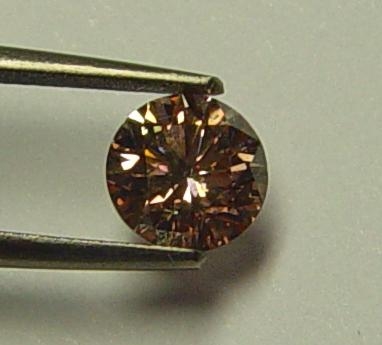Recently, a pink coloured diamond weighing 0.70ct was submitted to DCLA laboratory for certification and colour authentication. The colour was described as 3 PP on a diamond report issued by another Australian-based laboratory.
After routine examination however, DCLA discovered that when the diamond is viewed under high magnification with reflected diffused light, a patchy iridescent coating is visible on the surface. This coating is also easily visible on the pavilion facets of the diamond when viewed through the table. However, when the diamond is observed under magnification with regular diffused light, the pink coloration appears evenly distributed, particularly when viewed face up.
The pink colour is the result of a coating rather than from natural lattice defects in natural pink diamonds. Surface coating is the process of adding a thin layer of coloured foreign material to all or part of a gemstone’s surface, with the intent of either masking the underlying body colour or enhancing a desirable colour. Most often, this coating is applied to the pavilion and/or girdle of the diamond; the way that light refracts as it passes through a diamond creates the illusion of uniform colour distribution.
The durability of diamond coatings vary considerably, depending on materials used and methods of coating applied. Most recent advances in technology employ a very thin optical or chemical film which is more durable than older methods, but still readily worn away by heat, scratching, abrasion, polishing, and just everyday wear.
Coating is a deceptive practice; we do not know the number of coated pink diamonds which have entered the marketplace, but the DCLA has seen a number of treated stones of late. Of particular concern is when such treated diamonds are accompanied by seemingly legitimate reports or paperwork.
DCLA screens every diamond submitted to the laboratory for all known treatments, and will not issue a diamond certificate for treated or synthetic diamonds.
